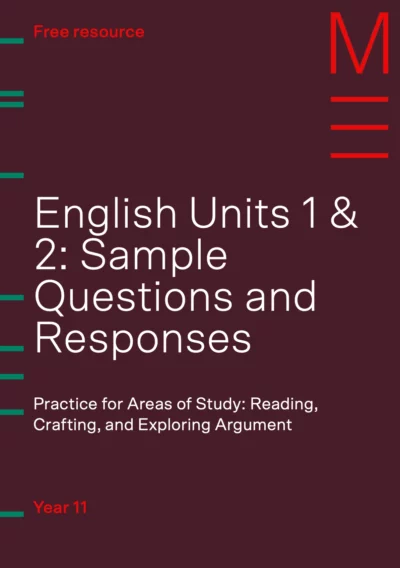Welcome to Matrix Education
To ensure we are showing you the most relevant content, please select your location below.
Select a year to see courses
Learn online or on-campus during the term or school holidays
Learn online or on-campus during the term or school holidays
Learn online or on-campus during the term or school holidays
Learn online or on-campus during the term or school holidays
Learn online or on-campus during the term or school holidays
Learn online or on-campus during the term or school holidays
Learn online or on-campus during the term or school holidays
Get HSC exam ready in just a week
Select a year to see available courses
Science guides to help you get ahead
Science guides to help you get ahead
Start Year 11 strong with this simple guide to VCE English Units 1 & 2—learn the essentials and boost your skills.

Join 75,893 students who already have a head start.
"*" indicates required fields
You might also like
Related courses

Join 8000+ students each term who already have a head start for English, Maths, OC/Selective Prep, Science, Biology, Chemistry or Physics.
VCE English Units 1 and 2 are all about building the core skills you’ll need for Year 12. While they’re not externally assessed, they’re still super important. These Year 11 units help you develop your analytical, creative, and persuasive writing. These skills are essential for success in Year 12 English (Units 3 and 4).
This article is Part 1 of mastering VCE English Units 1 & 2. We’ll focus on Unit 1 in this part and cover Unit 2 in Part 2 (coming soon).
In this guide, we’ll walk you through:
This guide will make VCE English Units 1 & 2 much easier to understand and help set you up for success in Year 12.
Get sample questions and answers for Units 1 & 2: Reading Texts, Crafting Texts, and Exploring Argument. Fill out your details below to get this resource emailed to you. "*" indicates required fields
Ace every Area of Study in VCE English

Ace every Area of Study in VCE English
The Year 11 English course is split into two units—each with two Areas of Study. Here’s how it breaks down:
| Unit | Area of Study | Title | Overview |
| 1 | 1 | Reading and Exploring Texts | Close study of one set text (chosen by schools) with a focus on forming and articulating personal connections and interpretations. |
| 1 | 2 | Crafting Texts | Creative writing for imaginative, persuasive and informative purposes, influenced by the careful study of three or more ‘mentor texts’ (chosen by schools). |
| 2 | 1 | Reading and Exploring Texts | Developing and deepening the inferential reading skills from Unit 1, focusing on one set text (chosen by schools) of a different type from that studied in Unit 1. |
| 2 | 2 | Exploring Argument | Studying persuasive writing and presenting skills, and delivering an ‘oral point of view presentation’ on a contemporary topic of local or national importance. |
So, what exactly are you expected to do in each part of Year 11 English? Below, we’ve outlined the essential skills for each Area of Study and how to apply them.
Key Skill | Explanation |
| Develop strategies for inferential reading and viewing |
|
Consider and explore:
|
|
| Engage productively in small group and class discussion, including listening to others |
|
| Develop, share and clarify ideas with peers and teachers employing appropriate strategies for discussion and debate |
|
| Plan and develop personal and analytical writing about a text, including the use of appropriate metalanguage to discuss vocabulary, text structures and language features |
|
| Use textual evidence, where appropriate, to support writing |
|
| Use appropriate strategies to review and edit writing |
|
| Apply the conventions of syntax, punctuation and spelling of Standard Australian English. |
|
Key Skill | Explanation |
| Employ and experiment with vocabulary, text structures and language features for effective writing |
|
| Write with a clear purpose (to express, to reflect, to explain or to argue) and an awareness of context (including mode) and audience |
|
| Develop and employ writing processes |
|
| Generate ideas, and discuss, develop and elaborate on these ideas |
|
| Explore voices appropriate to audience, purpose and context (including mode) |
|
| Experiment with vocabulary for effective writing |
|
| Plan, create, draft, refine and complete individual writing |
|
| Collaborate on the processes of writing with peers and teachers through discussion and feedback |
|
| Recognise and comment on vocabulary, text structures, language features and ideas used in effective writing |
|
| Reflect on and share the implications of authorial choices made in their own writing and in the writings of others |
|
| Apply standard and non-standard conventions of language, including syntax, punctuation and spelling, as appropriate. |
|

Download our free sample questions and solutions for VCE English Units 1 and 2 and get confident with your assessments!
Get sample questions and answers for Units 1 & 2: Reading Texts, Crafting Texts, and Exploring Argument. Fill out your details below to get this resource emailed to you. "*" indicates required fields
Ace every Area of Study in VCE English

Ace every Area of Study in VCE English
Written by Matrix Education
Matrix is Sydney's No.1 High School Tuition provider. Come read our blog regularly for study hacks, subject breakdowns, and all the other academic insights you need.© Matrix Education and www.matrix.edu.au, 2023. Unauthorised use and/or duplication of this material without express and written permission from this site’s author and/or owner is strictly prohibited. Excerpts and links may be used, provided that full and clear credit is given to Matrix Education and www.matrix.edu.au with appropriate and specific direction to the original content.